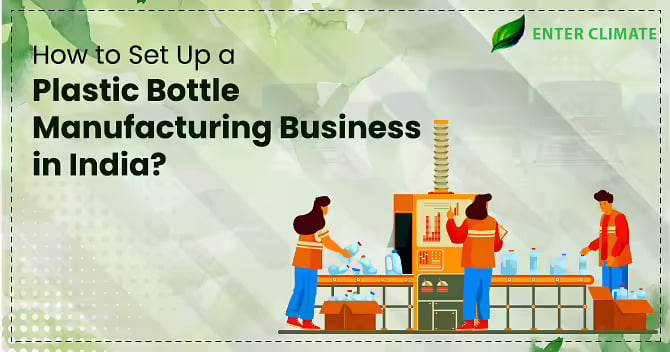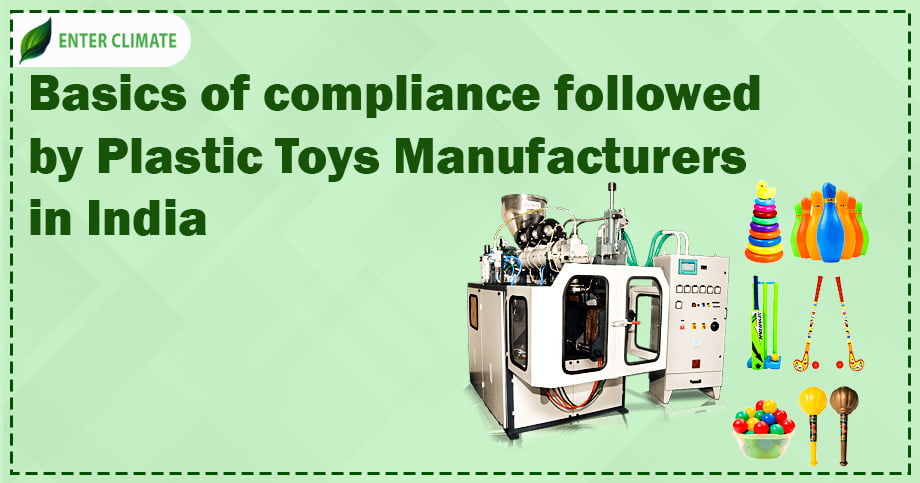How to Set Up a Plastic Bottle Manufacturing Business in India?
 19 Aug, 2022
19 Aug, 2022 
Plastic defines as a material which is suitable for moulding and has various properties like plasticity and malleability. Plastic can be categorised into various types, including:-
1. High-density polyethene, which includes shampoo bottles, freezer bags, ice cream containers and milk bottles
2. Protective Packaging and hot drink cups are included in Expanded Polystyrene (EPS)
3. Polypropylene microwave dishes, bottle caps, single-use face masks or potato chips bags.
4. Low-density polyethene includes containers, bags, food packaging film or trays.
5. Polystyrene includes cutlery, plates and cups.
6. Polyethene terephthalate (PET) includes Water Bottles, Biscuit trays, and dispensing containers.
With a production capacity of about 0.9 million tonnes, PET is one of the most popular plastic types in India. Global sales of plastic bottles are expected to have reached 480 billion in 2016, up significantly from 300 billion just ten years earlier.
Market overview of Plastic Bottle Manufacturing Business
The market for Plastic Bottle Manufacturing Business is proving to be very lucrative with the constant rise in demand for PET Bottles by various industries because of their elastic properties. The global new worth of PET bottles was estimated to be 12.7 million tons in the financial year 2019, with approximate compound annual growth of 2% + in 2014-2015. The market has also seen a spike due to the eco-friendly nature of PET bottles which are recyclable.
Target consumers for Plastic Bottle
The target consumers for Plastic Bottle in India are: –
- Pharmaceutical industry
- Packaged Water Industry
- Drinks industry
- Agro Chemical Industry
- Personal Care Industry
- Home Care Industry
- Edible oils industry
Registration Process for Setting up Plastic Bottle Manufacturing Business
Pre-requisite licenses required for Setting up Plastic Bottle Manufacturing Business
The license required before setting up for Setting up Plastic Bottle Manufacturing Business is: –
- Sales tax Registration
- UdhyogAadhar MSME Registration
- Professional Tax Registration
- NOC from Pollution Control Board[1] (NOC from Pollution Control Board refers to the Certificate to Establish and Certificate to operate from State Pollution Control Board under The Air (Prevention and Control Pollution) and The Water (Prevention and Control Pollution) ).
- Trade license
- Factory license (Regulation for factory license comes under Factory Act, 1948. The application for the factory license is sent along with a statement on the production undertaking. The license is acquired from the Chief Inspector of Labour Commissioner’s Organisation)
- Business registration with ROC
Procedure for Setting up Plastic Bottle Manufacturing Business
For setting up Plastic Bottle Manufacturing Business, the manufacturer or the producers’ have to first acquire the Extended Producers’ Responsibility certificate as stipulated under Plastic Waste (Management) Rules, 2016. The process of the registration consists of Filing the application, examination of the said application and granting the certificate.
- The Producers’/Importers/Brand Owners for filing an application should apply to Central Pollution Control Board through their online portal.
- Before the application, the producers’ have to register on the official site of the Central Pollution Control Board.
- After registration, the producers’ have to fill the form I in accordance with Plastic Waste Management Rules, 2016
- The application is submitted along with all the documents and the applicable fees that producers’/Importers/Brand Owners shall pay.
- Once the application is submitted, it is to be examined by Central Pollution Control Board.
- During the scrutiny of the application, if any shortcomings are found, the CPCB is required to notify the PIBOs within seven working days of the receipt of the application.
- After that, if there is no response from the PIBOs within thirty days from the receipt of a response from CPCB, the application will be considered to be withdrawn.
- In case of no shortcoming, the certificate is presumed to be granted if there is no response from CPCB within thirty days from the day of receipt of complete application with documents and applicable fees.
Documents required for acquiring Extended Producers’ Responsibility Certificate for Setting up Plastic Bottle Manufacturing Business in India
- District Industries Centre Certificate
- State Pollution Control Board/Pollution Control Committee issued Consent to establish under The Air (Prevention and Control Pollution) and The Water (Prevention and Control Pollution).
- State Pollution Control Board/Pollution Control Committee issued Consent to Operate under The Air (Prevention and Control Pollution) and The Water (Prevention and Control Pollution) Act.
- Proof of Sales in more than two states
- GST Certificate
- Documents related to EPR Action Plan
- Document issued by Urban Local Body / mandated state authority regarding engagement of Producers or other stakeholders.
- Certificate issued by state authorities to PWPF to be engaged with for PW processing
- Agreement of Waste management authorities or Producers with PWPF for PW processing.
- Agreement of PIBO with WMA
- EPR Target state-wise
| Category | Year | EPR Target (as a percentage of Q-Category-wise) |
| I | 2022-23 | 25% |
| II | 2022-23 | 70% |
| III | 2023-24 | 100% |
- In the case of water bottles, an FSSAI license is also required
- For acquiring FSSAI License, the producers require:-
- Chemist-Degree and medical certificate
- Microbiologist- degree and medical certificate
- Registration of a trademark
- SSI Registration
- Document regarding ownership/ Lease of land
- The ISI Mark Certificate (BIS Registration)
- The Pollution control certificate
- All obligatory test reports of raw and pure water
- Pest control permit
- Sanction layout plan
- Land (if not in the Industrial area should be NA)
- Medical certificates for workers-4
- Electrical load sanction
- Memorandum of Association (MOA) of companies / Partnership deed if applicable
- For acquiring FSSAI License, the producers require:-
Validity and Renewal
The new certificate/registration granted to Producers’/Importers/Brand Owners is valid for the period of one year as per the provisions of Plastic Waste Management Rules; in contrast, the subsequent certificate is valid for the period of three years.
For renewal of the certificate, the Producers’/Importers/Brand Owners are required to apply four months before the expiration of the registration. Along with this application, the producers’ also have to make sure that they submit the half-yearly report to the Central Pollution Control Board. Documents to be submitted for renewal of registration are: –
- Copy of original Registration certificate
- EPR Action Plan
- Filled Application format
The renewal of the registration shall be based on the compliance status informed by State Pollution Control Board/Pollution Control Committee.
Conclusion
Plastic, although have proven to be essential and very beneficial to the general public, has negatively impacted the environment causing excessive pollution. Therefore it is very important that, along with keeping in mind the market, the producers also take responsibility for their products and make sure that their products are correctly managed even after manufacturing.
Read our Article:Benefits of Obtaining CPCB EPR Authorisation for Plastic Waste












